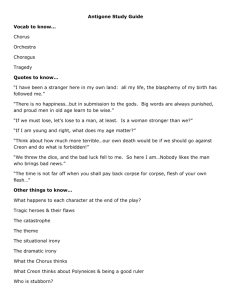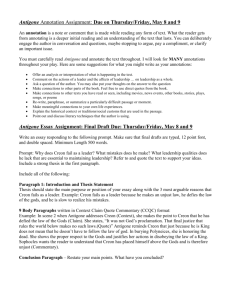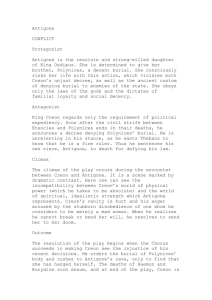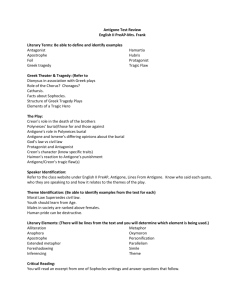literary analysis data sheet
advertisement
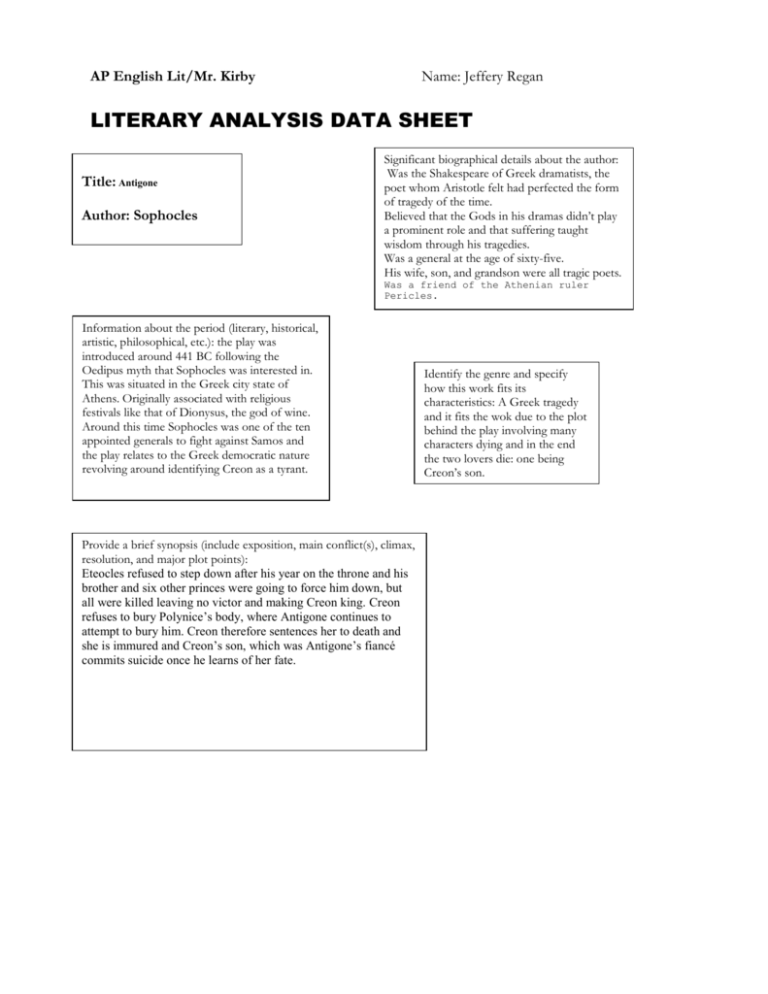
AP English Lit/Mr. Kirby Name: Jeffery Regan LITERARY ANALYSIS DATA SHEET Title: Antigone Author: Sophocles Date of Publication: Sources: Significant biographical details about the author: Was the Shakespeare of Greek dramatists, the poet whom Aristotle felt had perfected the form of tragedy of the time. Believed that the Gods in his dramas didn’t play a prominent role and that suffering taught wisdom through his tragedies. Was a general at the age of sixty-five. His wife, son, and grandson were all tragic poets. Was a friend of the Athenian ruler Pericles. Information about the period (literary, historical, artistic, philosophical, etc.): the play was introduced around 441 BC following the Oedipus myth that Sophocles was interested in. This was situated in the Greek city state of Athens. Originally associated with religious festivals like that of Dionysus, the god of wine. Around this time Sophocles was one of the ten appointed generals to fight against Samos and the play relates to the Greek democratic nature revolving around identifying Creon as a tyrant. Provide a brief synopsis (include exposition, main conflict(s), climax, resolution, and major plot points): Eteocles refused to step down after his year on the throne and his brother and six other princes were going to force him down, but all were killed leaving no victor and making Creon king. Creon refuses to bury Polynice’s body, where Antigone continues to attempt to bury him. Creon therefore sentences her to death and she is immured and Creon’s son, which was Antigone’s fiancé commits suicide once he learns of her fate. Identify the genre and specify how this work fits its characteristics: A Greek tragedy and it fits the wok due to the plot behind the play involving many characters dying and in the end the two lovers die: one being Creon’s son. Literary Analysis Data Sheet page 2 Identify and explain the use and effect of three literary techniques: Metaphor- used in some ways to describe characters and provide an insight into their past. Repetition- used throughout the play to display how everyone will carry out their own desire and while the other may carry out the opposite act. Simile- describes characters in a different sense comparing some to animals and how they may behave if not given what they want. Cite and quote one example of each: Repetition- "He will do what he has to do, and we will do what we have to do" (11). Metaphor- "Wasn't I a miserable little beast when we were small?" (10). Simile- "... clawing away like a hyena ..." (25). Significant Quotes Cite and quote three significant passages: “My nails are broken, my fingers are bleeding, my arms are covered with the welts left by the paws of your guards—but I am a queen!” (19) “I intend to give my brother burial. I'll be glad to die in the attempt, – if it's a crime, then it's a crime that God commands.” (7) “Isn't a man's right to burial decreed by divine justice? I don't consider your pronouncements so important that they can just. Overrule the unwritten laws of heaven.”(12) Explain the significance of each passage or explain how it relates to the work as a whole: The passage details when Antigone is brought before Creon for trying to bury the body, this leads up to the argument that follows and symbolizes Creon’s desire for power and control and sees that all must follow the law. The second quote is referring to Antigone’s defiance of Creon’s wish and vows to bury the man even if it means her death, which it does in the end. The third quote is Antigone justifying her actions for trying to bury the body of her brother and is pretty much saying Creon has no rule over her and her actions when they are justified by the heavens. Literary Analysis Data Sheet page 3 Characters Record information for each significant major character in the work Name Role in the story Antigone Tragic heroine Creon Antigone’s Uncle and ruling king of the time Significance or Purpose Adjectives She is the one that is willing to give her life up in order to bury another person that the ruling power refuses to bury and leads to her being shunned in the community and being executed. scrawny, sallow, withdrawn, and boyish The king left with the burden of the throne that just wants to keep peace and order, but when his niece, Antigone, defies the law and the state demands she be executed is put in a position to suffer at putting his own family up for execution setting up the tragedy. Weary, old, stressed, dedicated, and practical Spectators, inhabitants of Thebes, and also narrator. Along with dancers, singers, and the death messenger The Chorus frames the play with a prologue and epilogue, introducing the action and characters under the sign of fatality. Narrator and interceder Subjects of Creon that help maintain the law and his will among the people when things are good Truly spectators from another angle, but also help Creon carry out his will and are not affected by the tragedy at all in any way. Interpolations, untrustworthy, and mindless Ismene Antigone’s sister that follows Creon’s laws and is Antigone’s foil Attempts to persuade Antigone of not committing the actions she commits and desires to die with Antigone, but is refused, which changes her completely Loyal, good girl, obedient, and reasonable Nurse Provides the maternal nature that Antigone needs Her nature brings Antigone back to her girlhood and helps her with her worries like a mother would, so she could be called Antigone’s mother figure. Is put between the two people that matters most two him, Antigone and Creon, and in the end he chooses Antigone and follows her demise. Truly is a part of the chorus in general, but announces the death of characters. The Page is a figure of young innocence. He sees all, understands nothing, and is no help to anyone, but could become either of the main characters. Plays no significant role, but in the end her suicide leaves Creon dreading his actions for it left him entirely alone. Fussy, affectionate, caring, and reassuring The Chorus The Guards Haemon Antigone’s fiancé and Creon’s son Messenger Announcer of death Page Creon’s attendant Eurydice Creon’s wife Young, irresponsible, and unhappy Pale and solitary and in some sense menacing Innocent, unaware, and ignorant Kind, helpful, and maternal in a way towards Creon Literary Analysis Data Sheet Describe the setting(s) and explain its/their significance: Kingdom of Thebes, mainly around Creon’s royal palace and where the bodies were left to rot. The significance of the setting is providing the main cause of the climax to come in the play and where the confrontation begins. page 4 Identify and explain the theme(s) of the work: The theme is a tragedy or tragic and it personifies that the death of Antigone and her fiancé are all inevitable and cannot be changed or be prevented, thus for leaving Creon to suffering in his actions and mistakes alone for his wife also committed suicide further extending the tragedy. Identify and explain key metaphors, symbols, or motifs: Creon’s Wife is simply put in the play and her only role in life is to knit and die. When she dies it leaves Creon alone in the end and will be his final lesson symbolizing the life-thread spun, measured, and cut by the fates. The gray world as Antigone puts it sounds lifeless and cold and dark, but when she mentions it to the nurse she doesn’t try to hide the fact that she has been to the grave yard leaving to believe that the gray world is the graveyard void of life and anything happy. Write at least three questions or topics for class discussion: Why would Antigone risk her life to bury her brother and the others that were slain that Creon refused to bury and proclaimed that they shall rot like the animals they are? Why is Creon’s wife included in the play? Does she provide a deeper meaning into the theme and the actions of the other characters? Would you consider this play similar to Romeo and Juliet? If so why is it not as well-known as Shakespeare’s Romeo and Juliet? Could it have been ahead of its time and frowned upon by the community and people of the time?


